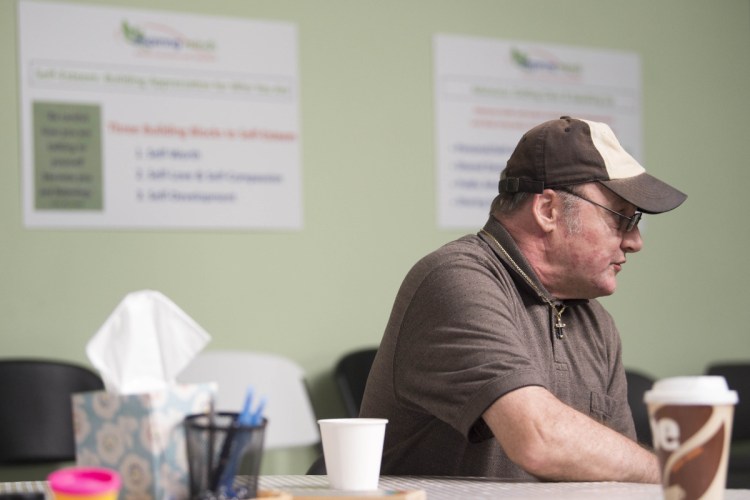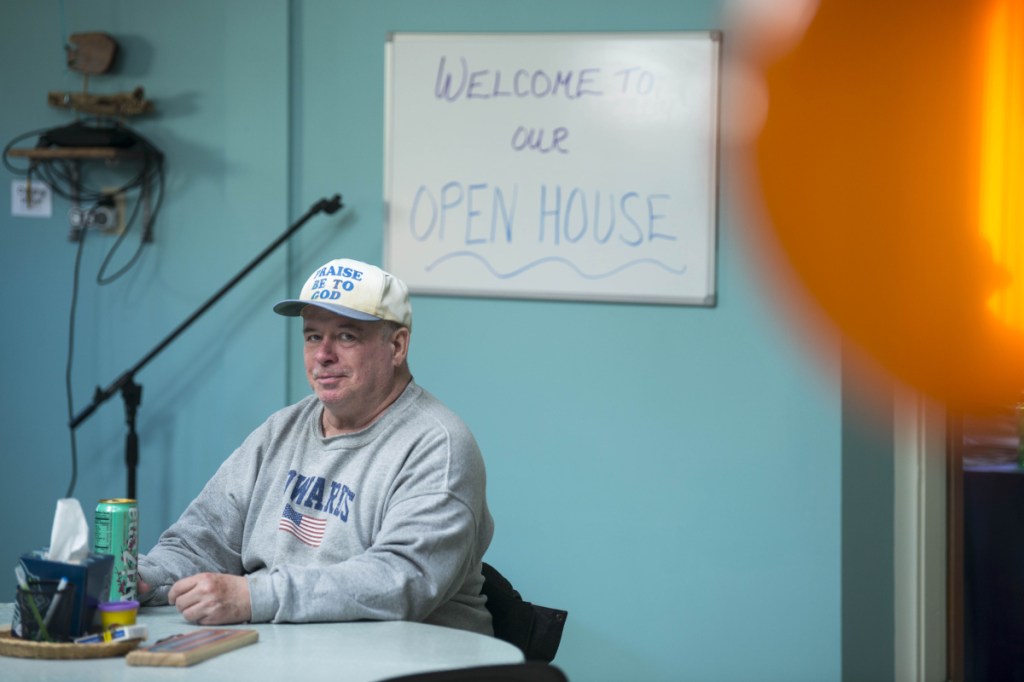WATERVILLE — It’s a nondescript building at the corner of Ticonic and Edwards streets, surrounded by apartment buildings on every side. A splash of green grass is fenced in next to a small parking lot in front of the few sections of the building’s brick facade.
But while the outside might not have much to show, the inside is where the real work begins.
The building at 32 Ticonic St. is the home of the Waterville Peer Recovery Center, an organization run by the National Alliance on Mental Illness Maine that provides support services to those who need them to deal with mental health and substance abuse challenges. The center held its grand opening on April 5, but center manager Elaine Ecker said the organization has been providing services while the inside of the building was being revamped.
Previously the Waterville Social Club, a group that aided adults recovering from mental illness, the new center has elements similar to the social club, but now offers more assistance through classes and support groups, Ecker said.
Available to anyone experiencing mental health or substance abuse crises, the center’s work is spread largely by word of mouth. Sometimes people are referred to the center by direct support workers, but those who need the services are welcome to come in at any point. Participants can go as often as they feel necessary, as there is no requirement for anyone to come a certain number of times.
Open 10 a.m. to 5 p.m. Monday, Wednesday and Friday and 10 a.m. to 8 p.m. Tuesday and Thursday, the center’s services are free, Ecker said
The center has about 60 members signed up. The only question asked of a person who comes in for services is whether he or she has any experience with mental health or substance abuse challenges, Ecker said.
“To have support, relationships with other people can make all the difference in someone’s life,” Ecker said.
The courses the center offers are peer-led, including a Wellness Recovery Action Plan, which Ecker said is a class designed to teach a person to take time and build a “wellness toolbox.” In challenging times, this can teach a person to be “more deliberate and plan-ful.”
An “alternative to suicide” group gives people a free space to talk about dark times in their lives and get the support they need.
A “hearing voices network” is a group where participants talk about times they saw visions or heard voices “without it being a big thing.”
Ecker said the center was important to the community because it enables people to be intentional about building relationships. Many of those who need these services are disenfranchised or isolated, she said, and knowing there is a physical place they can go is reassuring.
“They can just come in here and don’t have to explain,” she said.
The three employees at the center are all people who have lived experiences in helping others, Ecker said, and as the organization grows, she believes the members would have more and more to say. By giving those who need it a voice, that will translate to other actions in their lives, she said.
“The model is meant to empower the members,” she said.
Henry Horton is one of those members who use the center’s services. Horton remembers coming to the center a long time ago, when it was run by others, and liked helping out when it was asked of him.
“I helped when no one else does,” Horton said. “It makes me feel better. If I sit around, I don’t feel right.”
Colin Ellis — 861-9253
cellis@centralmaine.com
Twitter: @colinoellis
Copy the Story Link
Send questions/comments to the editors.






Success. Please wait for the page to reload. If the page does not reload within 5 seconds, please refresh the page.
Enter your email and password to access comments.
Hi, to comment on stories you must . This profile is in addition to your subscription and website login.
Already have a commenting profile? .
Invalid username/password.
Please check your email to confirm and complete your registration.
Only subscribers are eligible to post comments. Please subscribe or login first for digital access. Here’s why.
Use the form below to reset your password. When you've submitted your account email, we will send an email with a reset code.